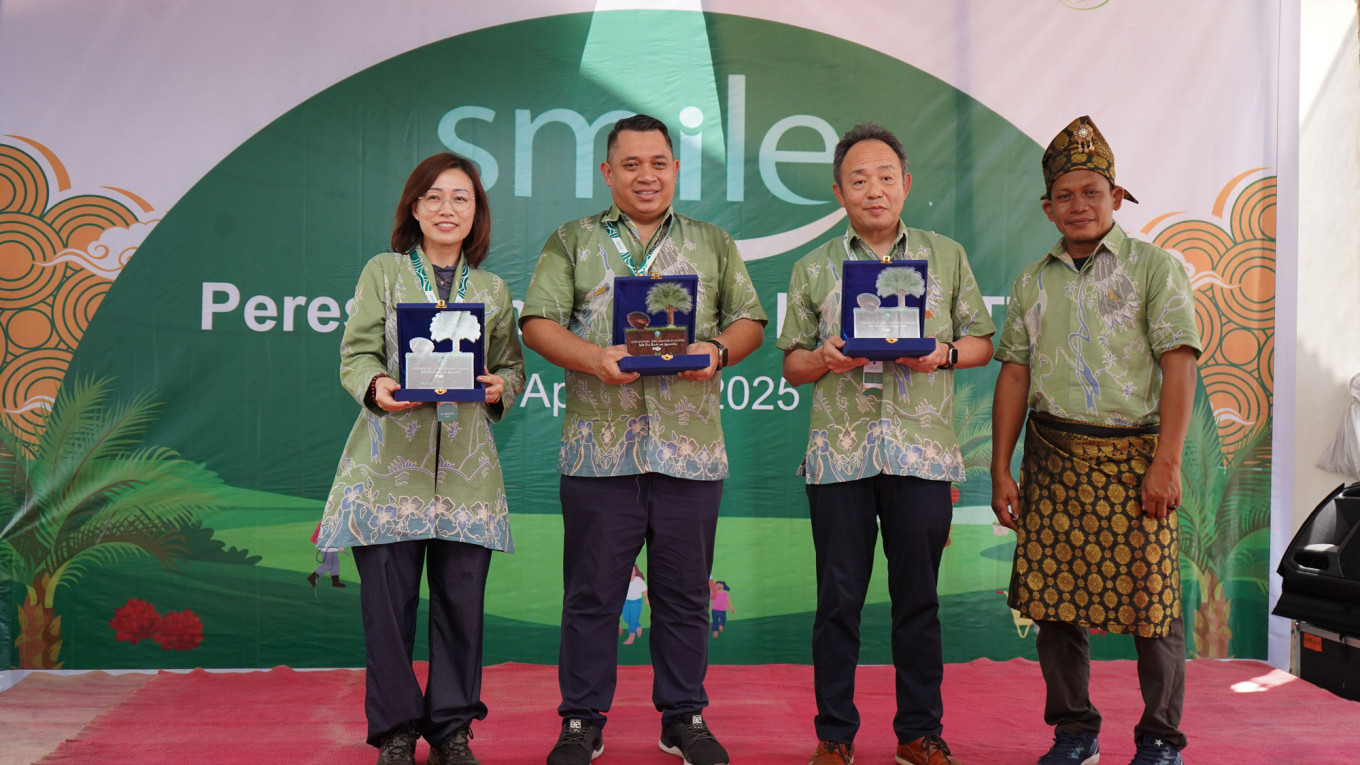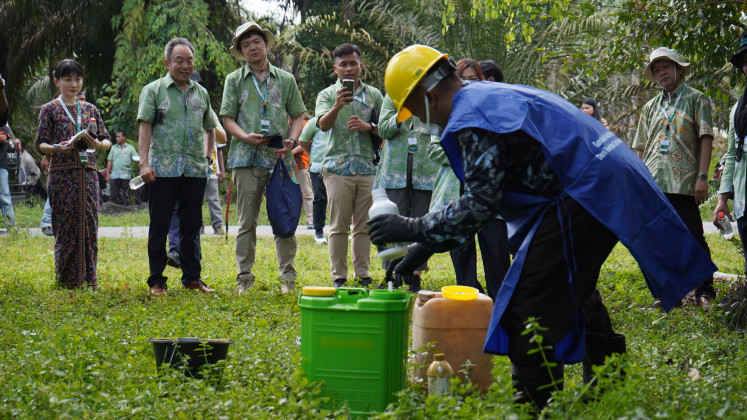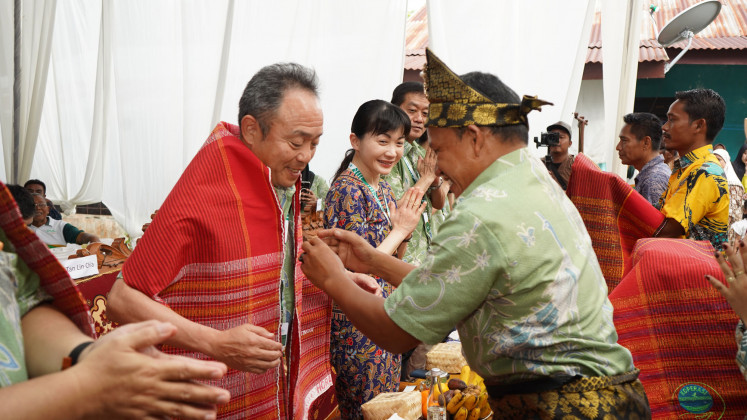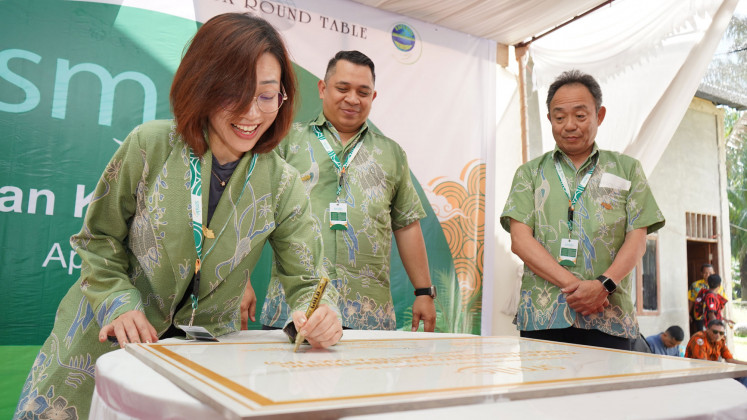Popular Reads
Top Results
Can't find what you're looking for?
View all search resultsPopular Reads
Top Results
Can't find what you're looking for?
View all search resultsSMILE transforms the palm oil industry, one farmer at a time
Change text size
Gift Premium Articles
to Anyone
“This new office is more than just a building. It represents years of hard work under the SMILE program. It will serve as a hub for cooperative activities, a place where we gather, learn and continue to grow together.”
On a warm morning in Tebing Tinggi Pangkatan Village, Labuhanbatu, North Sumatra, Khairul Anam, looked on proudly at the ribbon-cutting ceremony of Tebing Tinggi Pangkatan Sejahtera Cooperative (KTTPS)’s new office.
As the cooperative’s chairman, he oversees 773 smallholders and 1,814 hectares of oil palm plantations, spread across five villages. An independent smallholder himself, Khairul and KTTPS joined the SMILE program in 2020, saying he and other members of the cooperative have reaped the benefits ever since.
Joining the conversation, KTTPS member Imran said that prior to receiving mentoring and guidance from the SMILE program, smallholders were often haphazard in their planting process, using any seeds they could get their hands on. This, he continued, meant that their yields were not as bountiful as they are right now.
"Because some of our plantations were not in good condition, we didn’t really see much improvement in our production during our first year, but the results were noticeable by the third and fourth year,” he recalled.
”One thing that struck me the most is that all of our efforts were not in vain. We are now enjoying the fruits of our labor, and Apical, KAO and Asian Agri were there with us every step of the way. It is a proud moment when their officials were there with us smallholders as we inaugurated our new building,” Anam added.
SMILE, which stands for SMallholder Inclusion for better Livelihood and Empowerment, is a long-term collaboration between palm oil company Asian Agri, vegetable oil processor Apical and Japanese chemical and cosmetics company Kao Corporation.
Established in 2020, the program seeks to improve independent smallholder welfare, addressing productivity challenges through sustainable practices in their plantations to promote a more inclusive and responsible palm oil supply chain.
According to the Indonesia Oil Palm Statistics 2023 report by Statistics Indonesia (BPS), independent smallholders make up more than 40 percent of the 15.9 million hectares of oil palm plantations in 2023, along with producing more than 30 percent of the 47 million tons of crude palm oil (CPO) produced that year.
To date, SMILE has engaged 3,489 independent smallholders, 1,373 of whom have achieved Roundtable for Sustainable Palm Oil (RSPO) certification. The program supports Asian Agri’s goal of partnering with 5,000 certified smallholders by 2030.
A hands-on approach
Since its inception, the SMILE program has always taken a hands-on, feet-on-the-ground approach towards empowering smallholders, ranging from workshops and training sessions on yield productivity to implementing traceability and monitoring of fresh fruit bunches (FFB) through polygon mapping plantations.
That approach also applies to stakeholders Asian Agri, Apical and Kao, who sent a delegation of executives and representatives on a two-day field visit to Rantauprapat, North Sumatra.
From April 21 to 22, the agenda involved monitoring and evaluating independent smallholder farming practices, field inspections, and ideation sessions, which will serve as a foundation for improving future program support.
The series of activities kicked off with a visit to the Aek Nabara palm oil mill, operated by PT Supra Matra Abadi, one of the companies in Asian Agri. The delegation reviewed traceability and sustainable practices at the mill, which plays a key role in the SMILE program by processing FFBs and acting as an intermediary in the supply chain, connecting participating independent smallholders with Kao.
“At Kao, we believe in the Genba philosophy—going directly to the field to fully understand the situation. It’s important for us to witness first-hand how palm oil is produced. As a key raw material in our business, palm oil is strategic. We see Asian Agri and Apical as key partners. This visit reflects our shared commitment to achieving better outcomes,” said Kenji Terasawa, Kao’s Vice President of Procurement.
Tor Mooi See, Head of Sustainability at Apical Group, added that the visit was important to evaluate the SMILE program and shape its next steps.
“As we design the next phase of SMILE, our focus is on expanding the impact we’ve achieved. That means building stronger connections between mills and smallholders, providing continuous support and ensuring our supply chain remains inclusive and responsible from upstream to consumers,” she said.
In addition, Kao introduced Suara Petani, a grievance mechanism that serves as an official channel for smallholders to voice their aspirations, suggestions and complaints through the non-profit Caux Round Table (CRT). The platform was designed to strengthen structured and actionable communication, reinforcing accountability and transparency on the ground.
“SMILE isn’t just about support. It gives us the confidence that we can be part of a sustainable and transparent global supply chain,” Anam said.
A new paradigm
Along with helping smallholders maximize their yield through best practices and superior seedlings, the SMILE program also provides assistance in obtaining RSPO certification, which ensures a more sustainable and transparent supply chain as well as opening up a wider market for smallholders.
KTTPS’ new office, for example, was funded by premium payments from selling FFBs through the SMILE program, something that was not lost on Asian Agri’s Head of Sustainability Ivan Novrizaldie.
“The SMILE program shows that with technical assistance, capacity building and institutional support, smallholders can grow economically, socially and environmentally. This cooperative building is tangible proof of that progress,” he said.
With the program looking to expand its reach of smallholders, Ivan acknowledged that some smallholders are experiencing low yield, particularly those whose plantations are more than 20 years old.
Ideally, he continues, plantations more than 25 years old should undergo replanting to regain productivity, but the lengthy process will impact smallholders’ livelihoods in the time the oil palm trees grow.
To that end, the program has identified and supported alternative income streams for partner smallholders, including goat and cattle farming as well as composting.
But beyond the improved yield and other economic benefits, one thing the smallholders said was most important is how their mindset has changed for the better, particularly when it comes to the plantations.
The smallholders attending the inauguration noted that the SMILE program has gradually transformed the way they manage their farms by helping them understand the importance of recordkeeping, structured agricultural practices and the process toward certification standards.
KTTPS’ Imran said the smallholders in his village have become more developed, bringing improvements in land cultivation and working safety among other things.
According to Anam, who became RSPO certified in 2022, said the process brought both demand and guidance for smallholders to become more environmentally conscious, and thus kinder to the earth.
“The way I see it, the three pillars [of the SMILE program] are inseparable. KAO sees the smallholders’ potential, Apical helps our palm oil reach international markets, and Asian Agri is there with us every step of the way. If the chain is somehow broken, it would be hard to rebuild the smallholders’ progress and confidence in the work they are doing,” he concluded.














